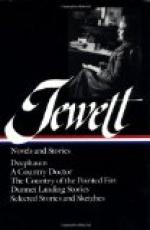There was a box in the lower part which Kate was glad to find, for she had heard her mother wonder if some such things were not in existence. It held a crucifix and a mass-book and some rosaries, and Kate told me Miss Katharine’s youngest and favorite brother had become a Roman Catholic while studying in Europe. It was a dreadful blow to the family; for in those days there could have been few deeper disgraces to the Brandon family than to have one of its sons go over to popery. Only Miss Katharine treated him with kindness, and after a time he disappeared without telling even her where he was going, and was only heard from indirectly once or twice afterward. It was a great grief to her. “And mamma knows,” said Kate, “that she always had a lingering hope of his return, for one of the last times she saw Aunt Katharine before she was ill she spoke of soon going to be with all the rest, and said, ’Though your Uncle Henry, dear,’—and stopped and smiled sadly; ’you’ll think me a very foolish old woman, but I never quite gave up thinking he might come home.’”
* * * * *
Mrs. Kew did the honors of the lighthouse thoroughly on our first visit; but I think we rarely went to see her that we did not make some entertaining discovery. Mr. Kew’s nephew, a guileless youth of forty, lived with them, and the two men were of a mechanical turn and had invented numerous aids to housekeeping,—appendages to the stove, and fixtures on the walls for everything that could be hung up; catches in the floor to hold the doors open, and ingenious apparatus to close them; but, above all, a system of barring and bolting for the wide “fore door,” which would have disconcerted an energetic battering-ram. After all this work being expended, Mrs. Kew informed us that it was usually wide open all night in summer weather. On the back of this door I discovered one day a row of marks, and asked their significance. It seemed that Mrs. Kew had attempted one summer to keep count of the number of people who inquired about the depredations of the neighbors’ chickens. Mrs. Kew’s bedroom was partly devoted to the fine arts. There was a large collection of likenesses of her relatives and friends on the wall, which was interesting in the extreme. Mrs. Kew was always much pleased to tell their names, and her remarks about any feature not exactly perfect were very searching and critical. “That’s my oldest brother’s wife, Clorinthy Adams that was. She’s well featured, if it were not for her nose, and that looks as if it had been thrown at her, and she wasn’t particular about having it on firm, in hopes of getting a better one. She sets by her looks, though.”




